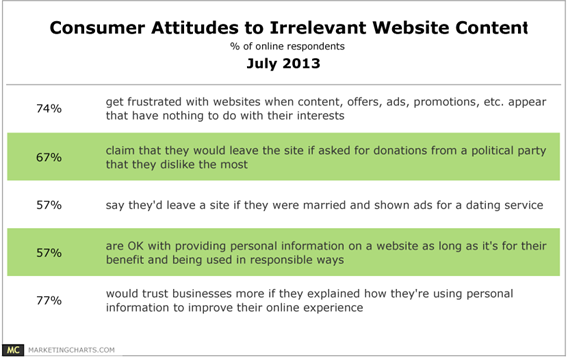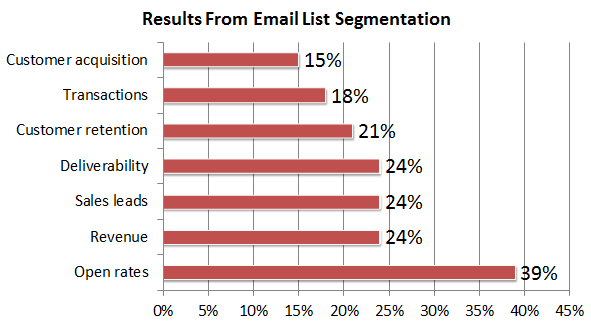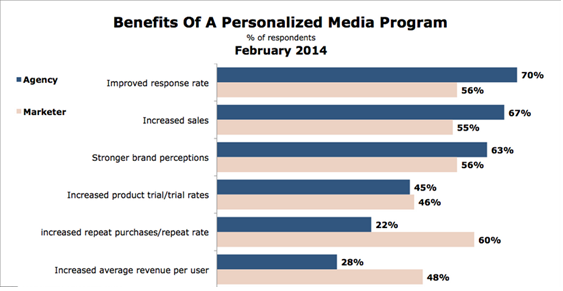WAYS CRM SOFTWARE CAN HELP YOU CREATE BETTER MARKETING CAMPAIGNS
Post summary:
- The explosion of content generation
- Why one-size fits all marketing doesn't work
- 4 ways to use CRM to create better marketing campaigns
Today’s consumers are literally bombarded with all sorts of messages and offers that spring out from every corner.
Think about it for a second, how many times per day do you receive a promotional email from a brand you signed up for?
And more importantly, how often do you actually read it?
It has never been as difficult as it is now for marketers to win customers, since “everyone is in marketing” these days.
Everyone is on social media, everyone has a blog, everyone can comment, share, spread the word – you name it!
Science Daily claims that a staggering 90% of all the data in the world has been generated over the last few years. While, the former CEO of Google, Eric Schmidt, has been quoted as saying that more content is now being created in 48 hours than all of the content produced between the dawn of time up until 2003.
Not to mention that every minute at least 347 blogs posts are published by WordPress users alone.
Such mind-blowing acceleration of information affected not only the pace, but also the way we understand and go about marketing.
Farewell to a one-size-fits-all approach
With the rapid boom of modern technology and spread of social media channels, customers have become increasingly fussy, discerning and tech-savvy. They know what they want, they have a wide choice, and they are not to be fed with just anything. Instead they demand personalized and diverse ways of engaging with products and services.
And that is why the good old method of targeting all with one message is not working any more. In fact, according to the 2013 Online Personal Experience study released today by Janrain, 74% of online consumers get frustrated with websites when its content, offers, or ads have nothing to do with their interests.
And not only do consumers get frustrated with irrelevant content, they are also willing to leave the site completely!

So, what does this mean for today’s marketers?
This means that the hip word now is RELEVANCE. Today, we are talking about the rise of a highly individualized marketing approach, which is mainly driven by data and technology.
As a result, the ways marketers do their jobs and fulfill their main duty – to increase interest through a lead nurturing strategy and to multiply customer conversions – have changed.
And it is a CRM system that can help marketers to stay atop of the game.
4 tips to create better marketing campaigns
Let's take a look at how CRM software can help you improve your activities and create better marketing campaigns in four key areas:
1. Focused targeting
One of the most difficult tasks for marketers' is to look through all of the customer data. In order to get a response from potential customers that are most likely to buy, marketers need to send out messages that appeal exactly to them.
Fortunately, CRM software helps marketers to sift through contacts and target potentially profitable customers. CRM software contains various information on the customer behavior and preferences, which allows to take informed actions that will improve prospect awareness and customer satisfaction.
2. Segmentation
They say that those who are able to predict, rather than react, win. The latter is very much true for marketers as they need to be able to notice common trends before they offer anything.
Marketers want to be able to segment not only by industry, jobs or age.
Yes, marketers want to able to segment by industry, job role and company size - a la, account-based marketing.
But, they also want to segment based on recent activities, responses, personal likes and dislikes, products already purchased, e-mails opened, e-mails replied, and even social media activity.
And, the sharper the potential customer’s profile is, the more opportunities the marketers have to personalize their messages and, in such a way, win the hearts of individuals!
If we use B2B email marketing as an example, segmenting your subscriber base will not only grow revenue, but all email marketing metrics will improve.

3. Personalized content
Once you have chosen whom you want to target and segmented the database into meaningful groups, it is time to individualize your marketing messages.
Let's start with the obvious “no-no” – no more anonymity, no more “Dear Customer”, “Hello Friend” or other impersonal addresses that scream “Mass marketing!”.
Today’s CRM systems allow you to address your potential and existing customers by their name. Also, you can impress them by knowing what company they work for. Not to mention that knowing whether you are addressing a man or a woman, an ordinary salesperson or a top manager would significantly help you tailor the content of your messages and grab customers’ attention.
Equipped with these details, you can suggest an idea, give information, and even shape the entire communication in such a way that it suits that particular customer.
And the benefits of doing so are huge,as the more personalized the content is, the more likely you are to see improved response rates, stronger brand perception and increased revenue. In this way, CRM solutions enable marketing experts to focus more on the customer, not the product.

4. Recycle the blueprint
Wouldn’t it be great if we could find what works and then use it again and again instead of starting from scratch each time?
With CRM software, you can analyze whether your campaigns were successful and yielded any results. This takes out all guesswork and opinions and helps you only focus on those campaigns that were the best performing.
Once you find out which ones were the best performing, you can recycle the most successful campaigns and templates for new contacts and audiences. This leads to marketing costs going down and lead conversions going up. And who doesn’t want that?
Conclusion
With CRM, you can engage with your prospects and customers on a more personal level, anticipate your customers wishes and surprise them with knowing what they are interested in.
And you get to turn the old one-way street of marketing messages into a two-way dialogue between marketers and customers.
All in all, CRM software is not only able to supply you with a contact database and centralize your actions, but it also makes it easy for you to slice and dice the data into meaningful insights, and later shape the perfect target groups that would respond to highly individualized messages.
How are you using CRM software to create better marketing campaigns?
Let me know by leaving a comment below.
